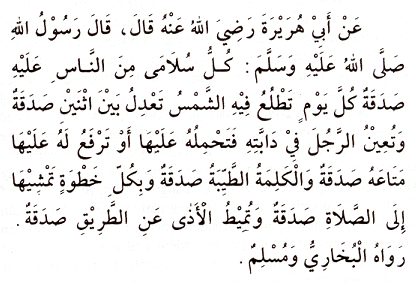Abu Hurairah (radhiyAllahu ‘anhu) reported that the Messenger of Allah (SallaAllahu ‘alayhi wasallam) said,
On every person’s joints or small bones (i.e. fingers and toes), there is sadaqah (charity) every day the sun rises. Doing justice between two people is sadaqah; assisting a man to mount his animal, or lifting up his belongings onto it is sadaqah; a good word is sadaqah; every step you take towards prayer is sadaqah; and removing harmful things from pathways is sadaqah.
Reported by Bukhari & Muslim
Brief Commentary:
- This hadith lays down the foundations of social interaction
- سلامى also means the finer bones we find in our hands and feet
- In Sahih Muslim, the prophet (SallaAllahu ‘alayhi wasallam) states that we have 360 bones in our body, therefore we understand from this hadith that we need to give sadaqah 360 times a day!
- Some scholars say that in this hadith, the prophet (SallaAllahu ‘alayhi wasallam) used the principle of pointing towards what is more worthy through reminding us of what is less worthy i.e. We are being reminded of the blessings which we may not think of and consider to be small, so from that we extrapolate that anything more significant needs to be considered too
- Other scholars said that the blessing of these small joints are in fact a great blessing that needs to be reminded as we cannot use our hands or feet without these joints and we can barely do anything without using our hands and feet
- We need to know Allah’s blessings over us so that we can show gratitude for it
- Reasons why we need to show gratitude:
- To maintain the blessing as the scholars say, “Hold on to the blessings of Allah by showing gratitude to Allah”
- So that the blessing does not turn into a punishment (usually in the hereafter)
- Most of mankind do not show gratitude to Allah, so we can be from the best of mankind who are a minority
- The opposite of gratitude is kufr (rejection)
- We will be asked about our blessings on the day of judgement
- Recognising and acknowledging the blessing in the heart is the first pillar of gratitude
- Pillars of gratitude:
- Recognising the blessing in the heart
- Using the blessing in a way that pleases Allah
- Thanking Allah for the blessing on the tongue
- Recognising the blessing of being able to show gratitude is far greater than the blessing itself due to the consequences of not being grateful
- The prophet (SallaAllahu ‘alayhi wasallam) said about a believer, “If good reaches him, he is grateful, and that is better for him” (Reported in Muslim) i.e. being grateful is better than any good he receives
- Ibn Rajab said that gratefulness is of two types:
- Obligatory: By using the blessing in a way that pleases Allah and not using it to disobey Him
- Recommended: Use the blessing for recommended actions e.g. praising Allah with the tongue
- “Doing justice between two people” is a very important part of Islam. The books of fiqh have a whole chapter on reconciliation between people
- This hadith encourages empathy (thinking about how others would feel), which is rare nowadays
- Other actions which are sadaqah include: humility in clothing and walking, belittling yourself, crying from the fear of Allah, contemplating over the signs of Allah.
Benefits and Action points:
- Ensure you pray the Duha prayer (minimum of 2 rak’ah between sunrise and midday) for the prophet (SallaAllahu ‘alayhi wasallam) stated in Sahih Muslim that it equates to giving sadaqah for all 360 bones in your body
- Appreciate the blessing of having these finer bones in your body
- Sit down, recognise, and contemplate over Allah’s blessings over you so that you may show gratitude for them
- Uphold the pillars of gratitude
- We need to thank Allah for enabling us to thank Him as that in itself is a blessing, so showing gratitude an endless cycle, and thus we should be doing it all the time

may almighty allah bless you
Can I be told two chapters of d Quran that support this hadith.
The Qur’an and the Sunnah/hadith are complimentary. We need both of them to know the religion. If for every hadith we must find a reference that supports it in the Qur’an, then there would be no point of having hadith, which is incorrect.
Either way, the topic of gratitude is found in many verses in the Qur’an e.g. 2:152, 10:10, 93:11
My name is sulaiman Hussain
Please I need the m
Greeat read thank you